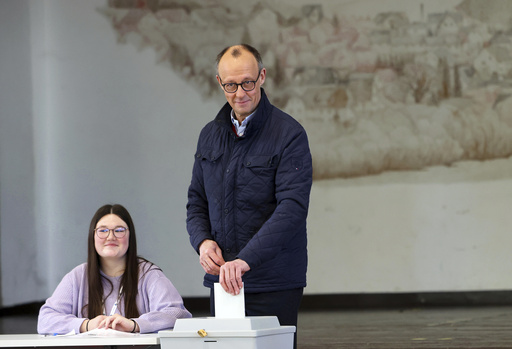German citizens are set to cast their votes on Sunday in a pivotal national election that sees the current Chancellor facing off against the opposition leader, the Vice Chancellor, and, for the first time, a representative from a far-right party.
Despite Germany’s electoral system often preventing any single party from securing an outright majority, current opinion polls indicate that no party is expected to reach that benchmark in this election either. It is likely that multiple parties will need to come together to form a coalition in the forthcoming weeks.
As the election unfolds, Germany, along with the rest of Europe, is addressing significant issues, including the new Trump administration, the ongoing Russia-Ukraine conflict, and overall security on the continent.
Chancellor Olaf Scholz currently leads a coalition made up of the Social Democrats, the Greens, and the Free Democrats. This alliance has been nicknamed the “traffic light” coalition, referring to the blend of the parties’ colors: red, green, and yellow.
The parties participating in this election represent various colors: black for the Union bloc, red for the Social Democrats, green for the Greens, yellow for the Free Democrats, and blue for the Alternative for Germany (AfD). Potential outcomes for the new government could include a “Kenya” coalition (Union bloc, Social Democrats, and Greens) or a “Germany” coalition (Union bloc, Social Democrats, and Free Democrats).
In addition, this election will see more than half a million newly naturalized Germans eligible to vote, with nearly one-third having roots in Syria. Many of these individuals fled their homeland in recent years due to war, instability, and economic challenges. During the migration waves of 2015 and 2016, over one million newcomers arrived in Germany, predominantly from Syria, along with others from Afghanistan and Iraq.
The importance of this election is heightened for Syrian migrants, many of whom escaped the civil war ignited by the actions of former President Bashar Assad. Although he was deposed in November, the future of democracy in Syria remains uncertain, so these newly naturalized citizens are eager to participate in Germany’s multi-party electoral process.
The formation of a governing coalition can be a prolonged process with no formal oversight or deadline. Friedrich Merz, the conservative leader and frontrunner, has expressed hopes of establishing a new government by mid-April, assuming he prevails in the election. In the meantime, Chancellor Scholz’s outgoing government is set to function on a caretaker basis until a new chancellor is elected by the Bundestag.
There exists a so-called “firewall” at the heart of German politics, wherein mainstream parties refuse to collaborate with any far-right groups that might undermine democracy—this stance particularly concerns the AfD participating in Sunday’s election. U.S. Vice President JD Vance’s comments in Munich earlier this month stirred controversy, as he suggested that there should be no firewalls, which many German leaders condemned.
The AfD, first elected to parliament eight years ago amid backlash against high levels of migration, continues to emphasize immigration reduction as its central platform. The party has skillfully broadened its appeal by capitalizing on frustrations with shifting energy policies, COVID-19 restrictions, and support for Ukraine post-Russia’s invasion round three years back.
Amid the political debates, Bayern Munich’s influential figure Uli Hoeness voiced his rejection of the far-right AfD. In an interview, he stated that he would approach any club players who back the party, questioning their allegiance to shared values. Hoeness has previously championed initiatives within Bayern that foster racial equality and integration, emphasizing the club’s commitment to diversity.
The new German government will play a critical role in shaping Europe’s stance towards the U.S. under Trump’s administration. Chancellor Scholz noted that a potential second Trump presidency would pose significant challenges. In a similar vein, AfD leader Alice Weidel has made declarations reminiscent of Trump’s slogan by pledging to “make Germany great again.”
In the lead-up to the election, mass protests against the AfD and the conservative frontrunner Merz have occurred, with demonstrators challenging the proposed strict migration policies backed by both parties. Former Chancellor Angela Merkel and many others have criticized Merz for allegedly threatening the “firewall” that protects against collaborations with extremist factions. Despite these claims, Merz has maintained his stance, asserting he will not partner with the AfD.
This election is particularly notable as it comes after Chancellor Scholz’s coalition collapsed last year alongside his loss of a confidence vote, leading the President to dissolve parliament and call for new elections. Scholz and Merz both cast their votes on Sunday, positioning themselves against one another, accompanied by their respective challengers, including environmental advocate Robert Habeck and AfD’s Alice Weidel.
With this election taking place ahead of schedule, it marks a significant moment in German politics, taking place within the context of ongoing geopolitical challenges both within Europe and beyond.
More than 59 million Germans are eligible to vote, with polls open from 8 a.m. to 6 p.m. local time, and preliminary results are expected shortly after voting concludes. Ultimately, this election could serve as a decisive influence in Germany’s political future and its response to critical international issues.
